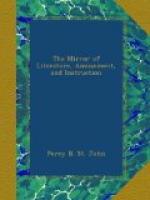“This penance was not merely assumed by such as were anxious to make atonement for some heavy sin; it was often voluntarily undertaken by individuals whose lives had been blameless, and who were anxious by this work of supererogation to increase their stock of merits. If the penitent died of his disease, the intention of his sacrifice was believed to be availing in the sight of Heaven; if he recovered, he became a monk. No less a doom than excommunication, and a rigorous penitential seclusion during life within the walls of a monastery, were hurled against such as married, or used their conjugal privilege, or laid down the habit. If, however, the married penitents were very young at the time he or she entered on the monastic obligation, in case of recovery the bishop had power to permit the use of matrimony a certain number of years. This was called an indulgence or dispensation, the debitum conjugale being totally annihilated by the obligations of the new state.
“This custom is not yet extinct in Spain, though, like many others of a similar kind, its observance is daily weakening since the period of the French revolution, and of the increased intercourse between the two nations. Many of the greatest names in the Spanish annals voluntarily assumed the profession, and thereby ceased to be laymen. Among these was the author of Don Quixote.”
* * * * *
THE GATHERER.
CONCEALED SORROW.
(From the portfolio of a Correspondent.)
There oft times dwells within the human breast, a grievous and a bitter sorrow; a sorrow once formed—seldom, if ever, entirely eradicated. Such sorrow hath borne down to the grave many a noble, though ill-fated, heart; there to seal up the remembrance of the degraded, the broken, feelings of its once fine nature, and for ever crush the spirit of its love. It is a sorrow that cometh not as the whirlwind’s rushing blast, in the fury of the tempest, or as the lion’s roar; but rather as the soft, still moan of the desert’s poisoned breeze, or as the silent gnawing of a cankering worm: so comes it preying on our heart’s fondest hopes till they gradually sink to ruin and oblivion. It is a grief that mortal eyes cannot see; it is only keenly felt; its tears are the wasting away of health, and its lamentation is the low beating of a sinking pulse. The loudest cry of its woe is but the dull, bitter sigh of its lonely unhappiness, engendered by the deep misery of the secret depression of its mental complaining, making the heart like a faded flower in a gloomy wilderness; like a blighted tree in a sultry waste. Weep! weep! and sigh from thy very soul; yet thy sorrows will not end; their root will still remain to spring and spread afresh. Unhappy they that such sorrows have! alas! for them! R.N.




